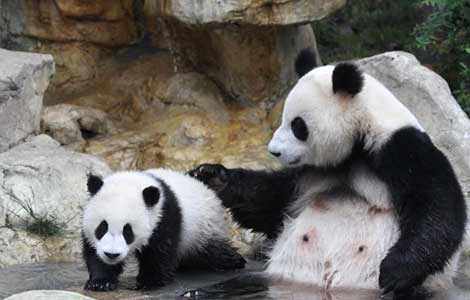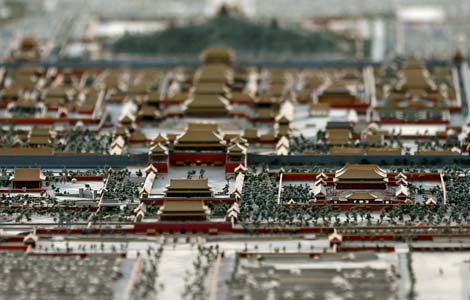Promoting Asian integration
Updated: 2013-08-23 08:30
By Chen Jimin (China Daily)
|
||||||||
Greater and inclusive cooperation requires that regional states play an autonomous role and work on the easy issues first
China and the Republic of Korea seem to hold different views on the role of the United States-ROK alliance. China believes that, as the legacy of the Cold War, the continuation of US-ROK alliance is one of the main reasons for the tensions on the Korean Peninsula, while the ROK regards the alliance as a linchpin for peace and stability on the peninsula and in Asia.
Historically, the US-Asian alliances were in response to the challenges of the communist bloc led by the former Soviet Union. With the end of Cold War, the targets for the alliances are becoming increasingly blurred. Logically speaking, the alliances should come to an end.
However, in order to further safeguard its Asian alliance system, the US has promoted a security threat in Asia from the Democratic People's Republic of Korea, while shaping a new strategic threat in China's rise. As relations between China and the major Asian countries have improved, the US has used various ways to try and project a China threat, in order to have a legitimate basis for keeping a US military presence in Asia. This has increased the distrust among major Asian countries, especially China and Japan, which has not only become an obstacle for the smooth development of their relationship, but also sowed the seeds for regional instability.
The US-Asian alliances have had a negative effect on Northeast Asian security, which is mainly reflected in the Korean issues, including the DPRK nuclear program, DPRK-ROK relations and DPRK-Japan relations. The alliance between the US and the ROK provides security protection for the ROK, but it also poses a security threat to the DPRK. As a result, there is a new pattern of imbalance on the peninsula, which could make the DPRK take risks, thus worsening the situation on the Korean Peninsula, and so posing a risk to peace and security in Northeast Asia.
The US-Asian alliances increase the uncertainties in relations between China and the US. The US allies in Asia include the ROK, Japan, the Philippines, Thailand and Australia. Among them, three countries have territorial disputes with China. Obviously, the US-Asian alliance system inevitably poses a challenge to China's security and sovereignty, at least psychologically. At present, the importance of Sino-US relations is clear, and so is their vulnerability. Since the Barack Obama administration launched its rebalancing strategy, the fragility of China-US relations has become more prominent. There is no denying that the success of the US' strategic transformation largely relies on the US-Asian alliance system. However, this transformation has created new uncertainties for relations between China and the US. Though the US has reiterated that the strategy is not aimed at containing China, and it is meant to deepen US credibility in the region at a time of fiscal constraint, many in China think the US' rebalancing toward the Asia-Pacific lays too much emphasis on the military, which obviously has big implications for China. Therefore, it is reasonable and necessary for China to take corresponding measures, including modernizing its military.
As the region has the most vibrant economies, the most complex geopolitics and the most cultural diversity, Asian countries have faced many challenges in promoting regional integration, especially in Northeast Asia, where Japan, the ROK and China are entangled by historical issues and territorial disputes. Since 2010, Sino-Japanese relations have been in a bad way. Moreover, due to the US' alliances with the ROK and Japan, there is lack of autonomy in policymaking for those two countries, which also severely restricts regional integration.
Promoting Asian cooperation requires that the regional states play an autonomous and leading role. Although the US has important interests in Asia, Asian countries should play the main role in promoting regional cooperation. Of course, this does not mean excluding the US from regional integration. In fact, Asian regional integration should be dominated by Asian states but demonstrate the openness and inclusiveness of the Asian system.
In the geo-economic landscape, relations between China, Japan and the ROK are the closest, and this determines their common interests in promoting regional economic and trade cooperation. But the three countries have a complicated dilemma in a geopolitical context, and relations have been soured by Japan's historical revisionism. As a result, once political factors outweigh economic and trade issues, all integration efforts come to naught. Therefore, in promoting cooperation in Northeast Asia, China, Japan and the ROK should separate the economy and trade from politics.
To promote Northeast Asian cooperation, the principle of gradual improvement and the approach of starting with the easy things first should be adopted. Nowadays, Northeast Asian countries have common needs in promoting economic growth. Therefore, the time is ripe for them to build an economic community in the region. Closer economic ties would lay a solid foundation and provide convenient conditions for Northeast Asian countries to build a comprehensive regional cooperation mechanism, which encompasses economic, security, political issues and other core elements.
Though there are many difficulties and constraints in the process, as long as there is sufficient political will and wisdom in the countries concerned, the prospects for regional cooperation in the Northeast Asia, even the whole Asia, deserve to be expected.
Chen Jimin is an assistant research fellow for the Institute for International and Strategic Studies at the Party School of the Central Committee of CPC. www.chinausfocus.com
(China Daily 08/23/2013 page8)
Most Viewed
Editor's Picks

|

|

|

|

|

|
Today's Top News
Bo Xilai denies bribery charges against him
US senator's comments draw fire
Chinese scientists asked to improve toilet
Experts say police need guns on patrol
Nasdaq resumes stock trading
German mitten crabs not 'qualified for import'
Chinese netizens debate upping retirement age
Egypt's Mubarak leaves prison
US Weekly

|

|















